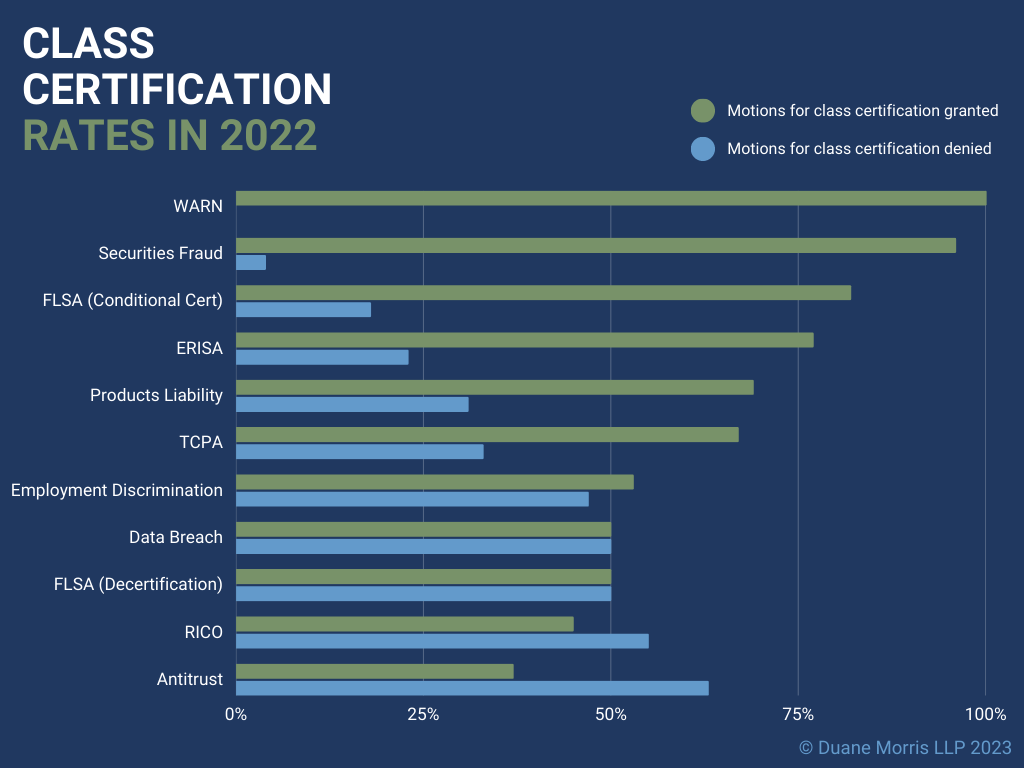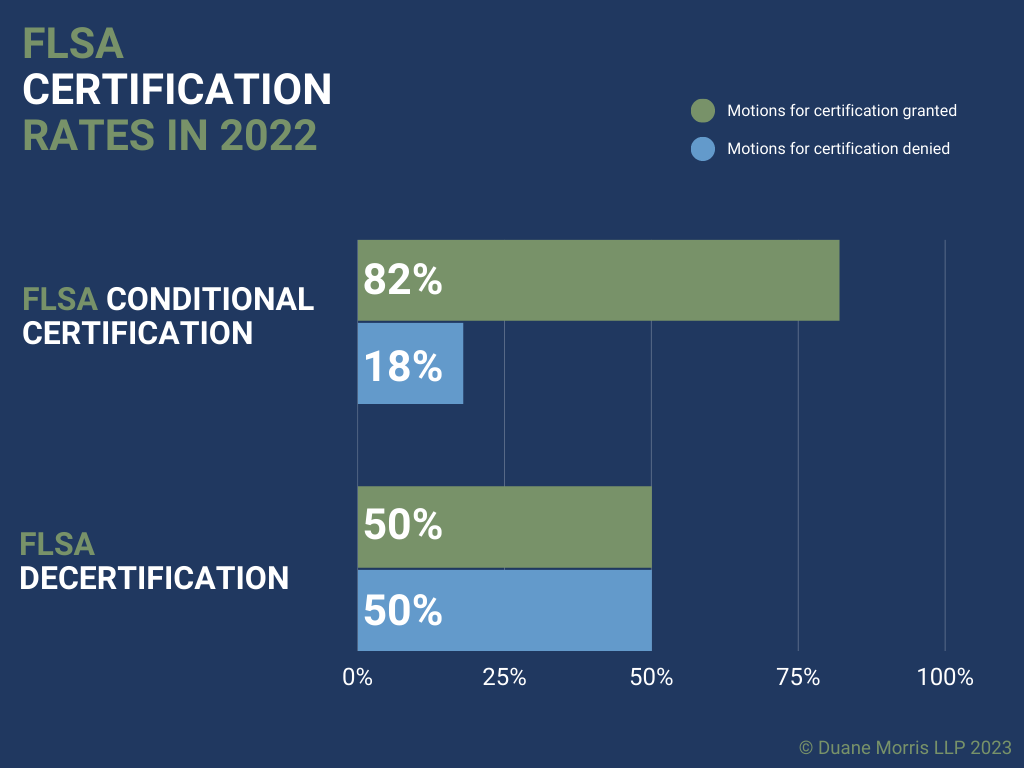 By Gerald L. Maatman, Jr. and Jennifer A. Riley
By Gerald L. Maatman, Jr. and Jennifer A. Riley
Duane Morris Takeaway: In 2022, the plaintiffs’ class action bar succeeded in certifying class actions at a high rate. Across all major types of class actions, courts issued rulings on 360 motions to grant or to deny class certification in 2022. Of these, plaintiffs succeeded in obtaining or maintaining certification in 268 rulings, an overall success rate of nearly 75%.
The number of motions that courts considered varied significantly by subject matter area, and the number of rulings they issued varied accordingly. The following summarizes the results in each of 10 key areas:
Securities Fraud – 96% granted / 4% denied
Data Breach – 50% granted / 50% denied
Employment Discrimination – 53% granted / 47% denied
ERISA – 78% granted / 22% denied
RICO – 45% granted / 55% denied
TCPA – 67% granted / 33% denied
WARN – 100% granted / 0% denied
FLSA (Conditional Certification) – 82% granted / 18% denied FLSA (Decertification) – 50% granted / 50% denied
Antitrust – 37% granted / 63% denied
Products Liability / Mass Torts – 69% granted / 31 % denied
The plaintiffs’ class action bar obtained the highest rates of success in securities fraud, ERISA, WARN, and FLSA actions. In cases alleging securities fraud, plaintiffs succeeded in obtaining orders certifying classes in 23 of the 24 rulings issued during 2022, a success rate of 96%. In ERISA litigation, plaintiffs succeeded in obtaining orders certifying class in 18 of 23 rulings issued during 2022, a success rate of 78%. In cases alleging WARN violations, plaintiffs managed to certify classes in 100% of the suits that resulted in decisions this year.
As to the FLSA, plaintiffs achieved a high rate of success on motions for conditional certification, and they also received a high number of rulings that dwarfs the number of other rulings by a substantial margin. In 2022, courts issued more certification rulings in FLSA collective actions than in any other type of case. The ease by which plaintiffs can obtain conditional certification surely contributes to the allure of that space to members of the plaintiffs’ bar. The plaintiffs’ bar has succeeded in gaining conditional certification in FLSA matters at a high rate year over year, contributing to the volume of filings in this area.
In 2022, courts considered more motions for certification in FLSA matters than in any other substantive area. Overall, courts issued 236 rulings. Of these, 219 addressed first-stage motions for conditional certification of collective actions under 29 U.S.C. § 216(b), and 18 addressed second-stage motions for decertification of collective actions. Due to the low burden at the conditional certification stage, plaintiffs historically have enjoyed a high rate of success on such motions. Rulings in 2022 was no exception. Of the 219 rulings that courts issued on motions for conditional certification, 180 rulings favored plaintiffs, for a success rate of 82%. Such rate is in line with and slightly higher than the historic rate of success that plaintiffs have achieved with respect to such motions.
At the decertification stage, courts generally have conducted a closer examination of the evidence and, as a result, defendants historically have enjoyed an equal if not higher rate of success on these second-stage motions as compared to plaintiffs. Again, 2022 was no exception. Of the 18 rulings that courts issued on motions for decertification of collective actions, 9 rulings favored defendants, for a success rate of 50%. Such rate again is in line with the historic rate of success that defendants have achieved at the decertification stage.
An analysis of these rulings, provided in Chapter 13, demonstrates that a disproportionate number of these rulings emanated from pro-plaintiff jurisdictions, including the judicial districts within the Second (33 decisions) and Ninth Circuits (19 decisions), which include California and New York, respectively. Similar to recent years, however, the number of rulings emanating from the Sixth Circuit (36 decisions) proved as high if not higher than the number of rulings in these traditional pro-plaintiff forums.
The following graph illustrates these variations:
These numbers no doubt flow from the different standards by which courts in different circuits evaluate motions for conditional certification and decertification and, in turn, the likelihood of plaintiffs’ success on such motions in these areas. Various factors discussed in this Review could impact these trends in 2023. If, for instance, the Sixth Circuit joins the Fifth Circuit in abandoning the two-step certification process, and thereby increases the time and expense of gaining a conditional certification order, it may lead to a reshuffling of the deck in terms of where plaintiffs seek to pursue cases.


